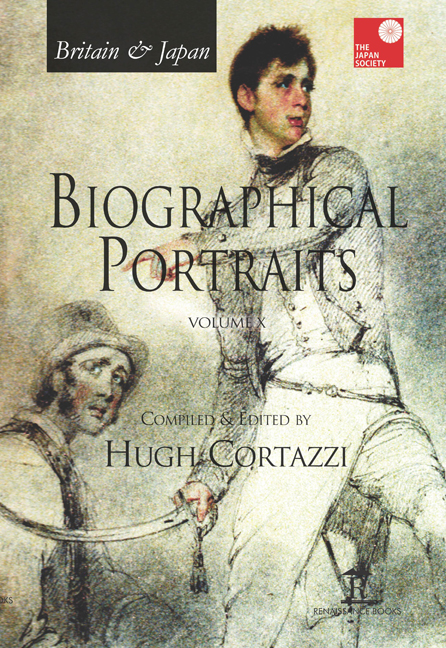Book contents
- Frontmatter
- Dedication
- Contents
- Introduction
- List of Contributors
- Index of Biographical Portraits in Japan Society Volumes
- PART I BRITAIN IN JAPAN
- PART II JAPAN IN BRITAIN
- Select Bibliography of Works in English on Anglo-Japanese Relations [Compiled by Gill Goddard – Retired East Asian Studies Librarian, University of Sheffield]
- Select Bibliography of Works in Japanese on Anglo-Japanese Relations [Compiled by Akira Hirano, SISJAC]
- Index
60 - Takakusu Junjirō (1866–1945): Buddhist Idealist, Scholar and Educator
Published online by Cambridge University Press: 07 May 2022
- Frontmatter
- Dedication
- Contents
- Introduction
- List of Contributors
- Index of Biographical Portraits in Japan Society Volumes
- PART I BRITAIN IN JAPAN
- PART II JAPAN IN BRITAIN
- Select Bibliography of Works in English on Anglo-Japanese Relations [Compiled by Gill Goddard – Retired East Asian Studies Librarian, University of Sheffield]
- Select Bibliography of Works in Japanese on Anglo-Japanese Relations [Compiled by Akira Hirano, SISJAC]
- Index
Summary
INTRODUCTION
THE MEIJI RESTORATION in Japan (1868) had a profound impact on the development of cultural exchanges between Japan and Western countries. Following the path opened by the Iwakura Mission (1871–1873), many Japanese students and young scholars were sent to European and American universities to engage with Western academic disciplines in order to foster the modernization of Japan. The field of Buddhist studies, with its long tradition within sectarian institutions, was deeply influenced and reshaped by historical and philological approaches acquired in these intellectual exchanges, to the extent that Japanese scholars would come to make significant scholarly contributions and gain international recognition for their efforts. It is in this context that we can best understand the key role played by Takakusu Junjirō.
At the age of twenty-five, Takakusu Junjirō began his studies in Indology and Buddhist Studies at Oxford University under the direction of the great philologist and scholar of religion Friedrich Max Müller (1823–1900) and of a distinguished handful of renowned European orientalists. After his return to Japan, Takakusu played an essential role in the establishment of modern Indology and Buddhist studies in the Japanese academy. Alongside other Japanese pioneers in the field, his contributions gained international recognition.
Takakusu was far more than a philologist. He edited a significant variety of works in related disciplines, translated a great many canonical texts and put considerable effort into the organisation, establishment and management of educational institutions. Takakusu was a man of his time, well-acquainted with contemporary socio-political élites and, in an astonishingly energetic and productive life, left a rich and varied legacy.
ACADEMIC CAREEER
Takakusu Junjirō was born Sawai Umetarō, in 1866, shortly before the start of the Meiji Restoration, in a mountain village in Hiroshima Prefecture. He changed his family name from Sawai to Takakusu following his marriage to Takakusu Shimoko. Junjirō was born in the last years of the Edo Period, an era of huge systemic and social change in Japan and one in which Japan's relations with the West underwent a sea-change that continues to this day.
Takakusu began to study kanbun – Classical Chinese and its Japanese reading and use – at the age of five, under his grandfather’s guidance. This skill would become valuable in his later studies of Buddhism. Takakusu's precociousness was such that he earned a teaching position in his home-town primary school when he was just fifteen.
- Type
- Chapter
- Information
- Britain & Japan Biographical Portraits Vol X , pp. 680 - 692Publisher: Amsterdam University PressPrint publication year: 2016

